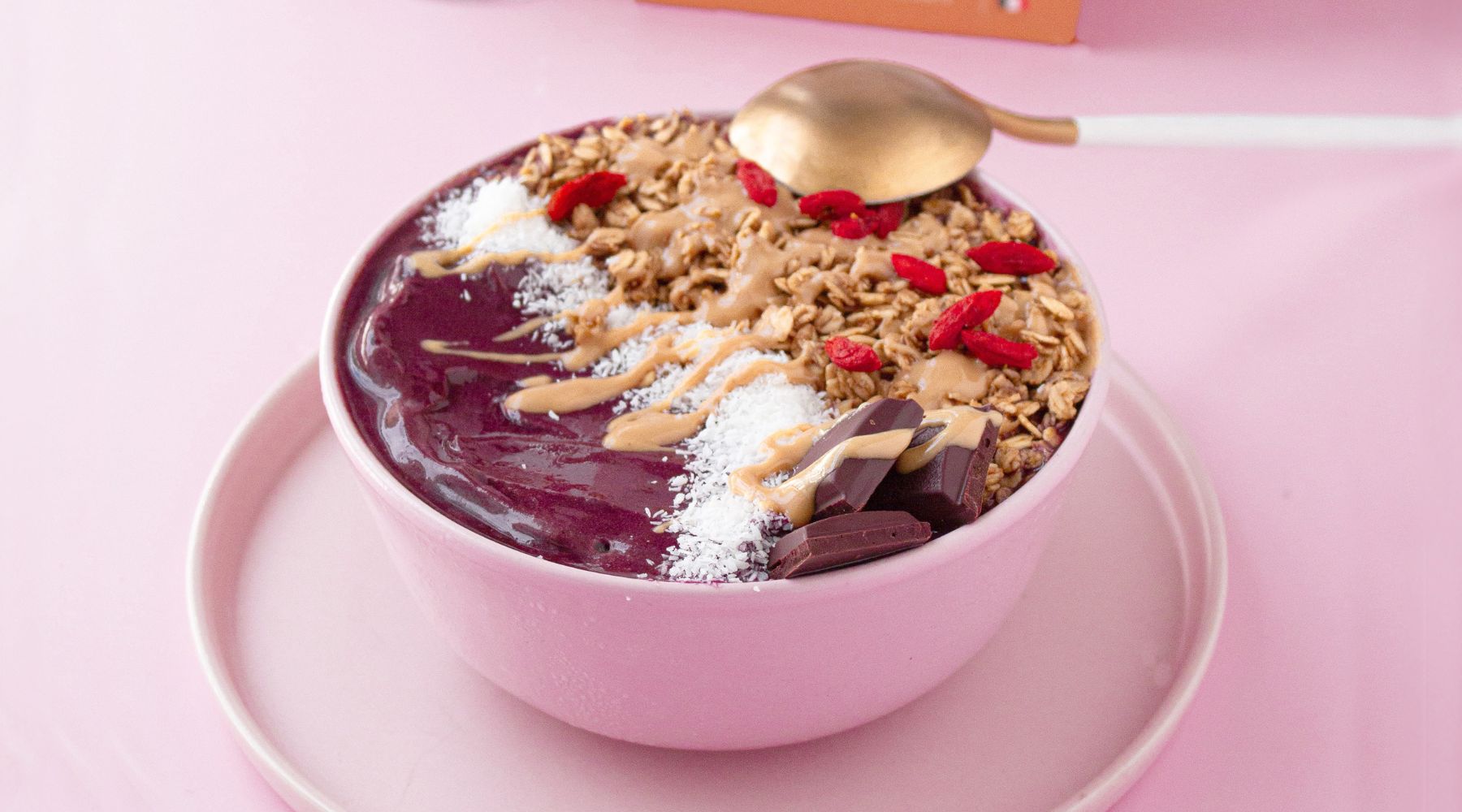Vous cherchez un petit-déjeuner sain, nutritif, rapide à préparer et qui vous tienne rassasié jusqu’à midi ? Et si le granola était la solution idéale ?
En faisant les bons choix, vous pouvez slalomer entre les granolas bourrés de sucres et d’additifs pour dégoter l’option parfaite et faire le plein de bonnes choses — avec à la clé un petit-déj ultra-savoureux !
- Quels sont les bienfaits du granola au petit-déjeuner ?
- How to choose high-quality granola?
- What to pair it with to fuel up and start your day off right?
In this article, we answer all these questions, with examples to guide you !
On voit pourquoi ce mélange iconique de flocons d’avoine, d’oléagineux et de fruits secs est un aussi bon choix pour le petit-déjeuner.
- Rich in fiber, vitamins, minerals and protein
- Perfect for digestion
- Super satiating
Let's take a closer look.
What is Granola?
Granola is that crispy, must-have mix for the modern breakfast, nowadays often enjoyed with a base of fresh yogurt and chopped fruit.
Typical granola ingredients include:
- Oat flakes
- Oléagineux : amandes, noix de cajou, noisettes, etc.
- Graines : graines de courge, de tournesol, etc.
- Fruits secs : raisins secs, cranberries, etc.
Créé par le médecin nutritionniste James Caleb Jackson vers la fin du 19ème siècle, le granola a rapidement gagné en popularité grâce à son goût irrésistible, ses qualités nutritionnelles…
Et sa polyvalence ! On peut très facilement varier les saveurs et tendre un matin vers une note chocolatée (qui met souvent tout le monde d’accord), une note épicée le matin suivant (en misant davantage sur la cannelle et la banane par exemple), une note acidulée avec quelques fruits rouges ou encore, une note exotique avec de l’açaï bien sûr !
The nutritional benefits of granola
Rich in fiber
Basé sur les flocons d’avoine, le granola est naturellement très riche en fibres.
And whe you add nuts, seeds and dried fruit, you get a perfectly balanced combo - especially today in Western Europe, where fiber deficiency is all too common.
What does it actually do? Fiber helps to :
- Réguler le transit intestinal
- Nourrir le microbiote intestinal
- Favoriser la sensation de satiété
- Support overall digestive health
Source of protein
Les protéines sont incontournables pour créer un petit-déjeuner équilibré.
Elles contribuent à la satiété de notre passage à table et à fournir une énergie douce et productive tout au long de la matinée
And on a deeper level, protein helps to :
- Maintaining muscle mass
- Support immune system function
- Boosting your metabolism
And once again, they're absolutely everywhere in your granola bowl !
Among plant-based protein sources, nuts and seeds, which make up a good portion of granola, are well-known contributors to its protein content.
On peut également mentionner le yaourt, lorsqu’il est servi avec, et les flocons d’avoine — auxquels on ne pense pas forcément tout de suite, et qui contiennent malgré tout environ 14g de protéines pour 100g.
Source of healthy fats
We owe a lot to the power of good fats. They play a major role :
- Pièces maîtresses de la satiété d’un repas
- Cruciales pour fournir de l’énergie en continu toute la matinée
- Indispensables à l’absorption des vitamines liposolubles (A, D, E et K)
And once again, hats off to nuts and seeds, those nutrient-packed superstars !
Vitamin and mineral intakes
Granola, if chosen wisely, is naturally rich in essential vitamins and minerals:
- Magnésium : les amandes, les graines de courge et les flocons d'avoine sont riches en magnésium, un minéral crucial pour la fonction musculaire, la santé osseuse et la régulation de la glycémie.
- Zinc : on le trouve dans les graines de courge et les graines de sésame. Le zinc est important pour le système immunitaire, la cicatrisation des plaies et la synthèse des protéines.
- Fer : présent dans les flocons d'avoine, les graines de courge et les amandes, le fer est essentiel pour la production de globules rouges et le transport de l'oxygène dans le corps.
- Vitamine E : présente dans les amandes, les noisettes et les graines de tournesol, la vitamine E est un antioxydant puissant qui aide à protéger les cellules contre les dommages oxydatifs.
- Vitamine B1 (Thiamine) : on la trouve dans les flocons d'avoine et les graines de tournesol. La thiamine est essentielle pour le métabolisme des glucides et le bon fonctionnement du système nerveux.
- Vitamine B2 (Riboflavine) : présente dans les amandes notamment, la riboflavine joue un rôle crucial dans la production d'énergie et le métabolisme des graisses.
You'll also find vitamins B3 and B6, potassium and phosphorus, all essential micronutrients that prove, without a shred of exaggeration, that a well-built breakfast is a golden opportunity to load up on goodness.
Granola and satiety
Le granola (s’il n’est pas trop sucré — c’est primordial) est particulièrement efficace pour créer une vraie satiété qui dure toute la matinée grâce à sa combinaison de fibres, de lipides et de protéines.
Each of these three components plays its own role:
- Fiber guides and slows the movement of food through the digestive tract
- Fats slow down the release of food from the stomach into the intestine.
- Protein require more effort from the digestive system
This naturally leads to a breakfast that's easier on the body, keeping you fuller for longer and helping you ride a steady wave of energy all morning.
A low glycemic index
L'indice glycémique (IG) mesure la capacité d'un aliment à augmenter le taux de sucre dans le sang (notre glycémie).
Today, understanding the importance of GI is crucial, especially when it comes to breakfast, as the first meal of the day can have a major impact on your metabolic health.
The importance of avoiding high-GI foods
The traditional breakfast table brings together some of the worst sources of carbs to start the day:
- White bread
- Fruit juices
- Jam
- Industrial chocolate spreads
- Overly sweetened commercial cereals
- Industrial breakfast pastries
These foods are very rich in carbs and have a high GI, causing a sharp spike in blood sugar, followed by an equally sharp drop.
This sudden fluctuation can lead to :
- Des fringales dans la matinée
- Des troubles de la concentration
- Increased risk of developing long-term metabolic health issues (pre-diabetes, type 2 diabetes)
Et surtout : ces fluctuations s’entretiennent ! Une chute de notre glycémie influencera grandement nos choix alimentaires et nous fera consommer davantage d’aliments riches en glucides et à l’IG élevé, ce qui créera à nouveau une chute, influencera nos choix, etc.
Granola: a low-GI alternative
Granola, if it's low in sugar, generally has a lower GI than many other sweet breakfasts.
This means that :
- Il fournit une énergie plus stable et plus durable :
- The gradual release of glucose into the bloodstream prevents energy spikes and crashes.
- You stay alert and focused for longer.
- Il aide à contrôler le poids :
- Stable blood sugar levels reduce cravings and the over-consumption of high-carb foods, and limit fat storage.
- They help regulate appetite more effectively throughout the day.
- Il favorise de meilleurs choix alimentaires au déjeuner :
- By avoiding the "false hunger" caused by a blood sugar crash, you're less likely to reach to unhealthy options at your next meal.
- Il contribue à une meilleure santé métabolique à long terme :
- Regular consumption of low-GI foods can help prevent the development of type 2 diabetes and other metabolic disorders.
By choosing a high-quality granola, that's low in sugar and rich in fiber, you're opting for a breakfast that not only tastes great, but also supports your metabolic health in the long run.
Ideal for morning focus
Comme le rappelle à de nombreuses reprises le célèbre neuroscientifique Andrew Huberman dans son podcast à succès : le cerveau a besoin d'un apport régulier en glucose pour fonctionner de manière optimale.
Le granola, avec son mélange de glucides complexes, de fibres, de bons lipides et de protéines, fournit un apport en glucose doux et constant, idéal pour maintenir la concentration tout au long de la matinée.
Granola for breakfast: quick, easy and endlessly adaptable
Le granola est une des options petit-déjeuner les plus pratiques et rapides à préparer.
Votre bol se construit en un éclair le matin dans la cuisine.
And when it comes to customization, granola is a real champ!
Your basic granola can lean toward chocolatey, tangy or spiced... And you get to enjoy experimenting with your favorite nuts and seeds (whole or in butter form) or your favorite fruit.
And if you're short on inspiration, you'll find tons of idea online! Granola lovers make up a super creative and generous community.
How to choose a granola that's good for your health
Avec les produits petit-déjeuner plus qu’avec n’importe quels autres produits, il est crucial de lire les étiquettes.
Why ? The first meal of the day is THE historical stronghold of ultra-processed food.
They're packed with additives and some of the worst sweeteners for your health (like glucose-fructose syrup, for example).
Pour choisir le meilleur granola, voilà le big four de nümorning, les experts du petit-déjeuner sain et savoureux :
- Bio : privilégiez les granolas issus de l'agriculture biologique
- Naturel : évitez les additifs et les conservateurs artificiels
- Peu sucré : optez pour un granola avec une teneur en sucre modérée
- Sucré avec un bon sucre : préférez les granolas sucrés au sucre de coco (de très loin le sucrant le plus sain et le plus intéressant sur le plan nutritionnel)
How to include granola into your breakfast routine
Adding granola to your morning routine couldn't be easier, and can be done in many different ways.
Voici quelques idées pour varier vos petits-déjeuners tout en profitant des bienfaits du granola.
Granola on a yogurt base with fresh fruit: a timeless classic
Cette combinaison incontournable offre un équilibre parfait entre saveurs et bienfaits.
Here are some ideas to get you started:
- Granola chocolat : en partant d’un granola au chocolat, ajoutez une base yaourt végétal, une banane et des amandes ou des noisettes
- Granola fruits rouges : en partant d’un granola nature, ajoutez une base yaourt végétal, un mélange de fruits rouges et des graines de courge
- Granola pomme-cannelle et beurre de cacahuète : en partant d’un granola à la cannelle, ajoutez une base yaourt végétal, une pomme en dés et une généreuse cuillère de beurre de cacahuète
Granola on a mashed banana base
You can swap the yoghurt base for a ripe mashed banana.
And if this base isn't as creamy as you'd like, feel free to add a dash of plant-based milk to your banana before adding your granola.
Granola as a topping
Granola has more than one trick up its sleeve ! Use it to add crunch to :
- Un açaï bowl (jetez un œil à notre recette juste ici)
- Porridge
- A bowl of fresh fruit
- A Chia pudding
Granola to-go
Pour les matins pressés, versez deux belles poignées de granola dans une lunchbox et ajoutez des ingrédients secs (fruits secs, éclats de chocolat, copeaux de noix de coco, graines et oléagineux).
Granola, a healthy breakfast choice ?
Mille fois oui ! A condition qu’il soit bien choisi.
C’est un plein de saveurs et de nutriments essentiels dès le petit-déj, qu’on peut adapter à toutes les envies et qui se prépare en un clin d’œil.
Et c’est une source d’énergie douce et durable absolument idéale fonctionner de manière optimale jusqu’au déjeuner, sans jamais être dérangé par la faim.


